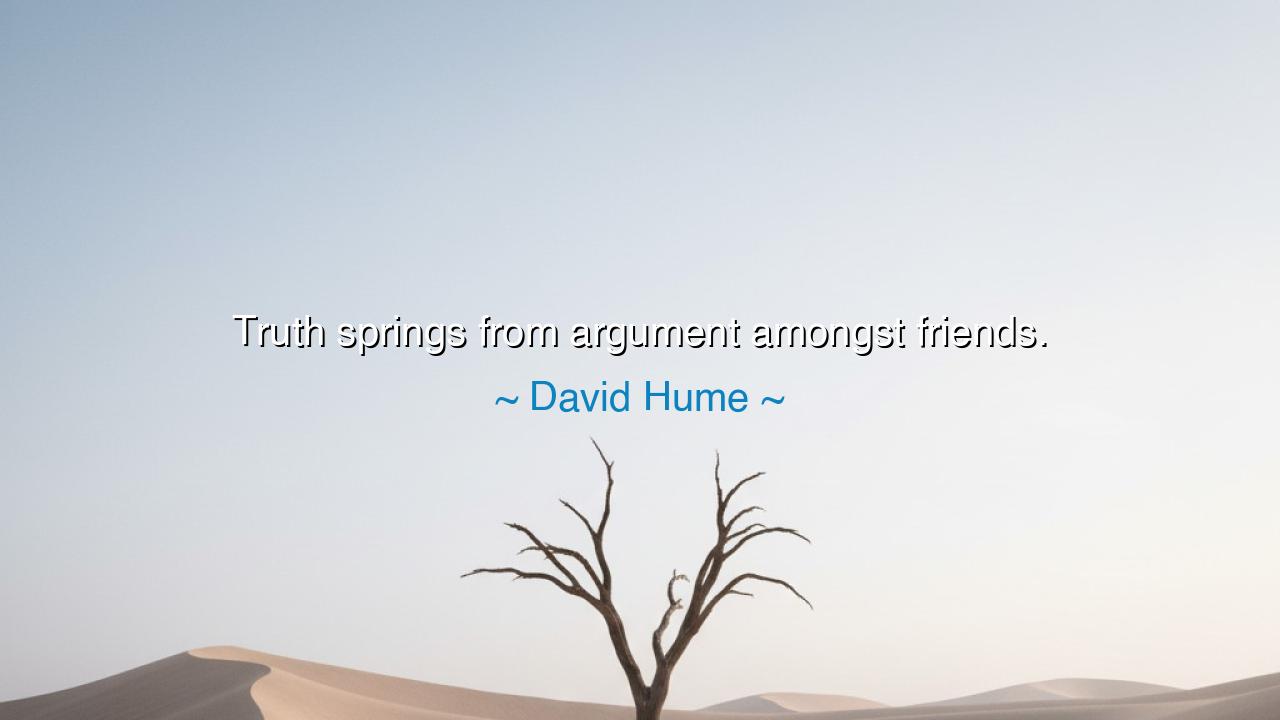
Truth springs from argument amongst friends.






“Truth springs from argument amongst friends.” So declared David Hume, the great Scottish philosopher, whose mind sought clarity in the fog of human passions. His words carry the weight of timeless wisdom, reminding us that truth is not a possession grasped by one man alone, nor a treasure found in silence, but a flame kindled in the clash of minds united by trust. It is through argument, sharpened by honesty and softened by friendship, that truth is brought forth into the light.
The ancients themselves knew this secret. Socrates, master of the dialectic, walked the streets of Athens not to preach, but to question. He gathered young men around him—not as disciples of blind obedience, but as companions in debate. In their arguments, ideas collided, illusions were shattered, and fragments of truth emerged. Yet what made this possible was not hatred or rivalry, but a bond of respect. Socrates could question his companions harshly, even mockingly, yet because friendship undergirded the exchange, the wounds of argument healed into wisdom.
Consider also the bond of John Adams and Thomas Jefferson, two men who forged a nation in the furnace of disagreement. They quarreled bitterly over philosophy and politics—Adams the defender of order, Jefferson the champion of liberty. Their debates were fierce, their words sometimes cutting. Yet beneath the quarrels lay respect, and when old age softened their rivalry, they corresponded as friends once more. Out of their long arguments, truth was born—not a single truth, but the balanced wisdom that both liberty and order are needed to sustain a republic. Their friendship preserved the debate, and the debate preserved the truth.
Hume’s teaching also speaks against the danger of silence. Where there is no argument, there is often no truth. In courts ruled by tyranny, men whisper instead of debate, and in that silence, lies reign unchecked. But among friends, where the bonds of trust allow for honesty, even the hardest truths may be spoken. A friend may say what no flatterer dares; a friend may challenge what no enemy cares to correct. Thus, friendship becomes the soil where truth may take root, watered by argument and warmed by affection.
Yet let us not mistake this wisdom. Argument without friendship is destruction, just as friendship without honesty is flattery. The one is fire without hearth, the other is a hearth without fire. But when the two are joined—argument and friendship—they form a crucible in which truth is refined. This is Hume’s lesson: only when we can dispute with love and challenge with respect do we reach the clear water beneath the mud of opinion.
So, children of tomorrow, learn this well: seek out friends who will argue with you, not flatter you. Cherish those who question you, who test your beliefs, who dare to say, “You are wrong,” not to wound but to strengthen. And be such a friend to others: bold in honesty, gentle in tone, steadfast in loyalty. For it is only in this sacred balance that truth springs forth.
Make it your daily practice to welcome debate among those you trust. Do not fear disagreement, for it is the hammer that shapes wisdom. Do not cling to pride in argument, for the aim is not victory but truth. And when you find companions who will walk this path with you, honor them as treasures beyond gold. For Hume has spoken truly: truth is not born of silence, nor of flattery, but of argument amongst friends. And those who live by this wisdom shall walk in clarity, while others stumble in shadows.






BDBao Do
Hume’s quote suggests that the process of arguing with friends leads to truth. But does this mean we need disagreement to uncover deeper insights, or can we find truth in peaceful discussions? Is it possible to have a meaningful exploration of truth without conflict, or is tension an essential part of the discovery process? How do we balance respectful debate with the need to preserve friendships and avoid unnecessary conflict?
MQNguyen Minh Quan
Hume’s idea that truth springs from argument amongst friends makes me think about how our relationships shape our understanding of reality. But what happens when arguments with friends go unresolved or turn toxic? Can truth still emerge from that discord? Is it always necessary to argue in order to reach a deeper understanding, or is there a way to find truth without conflict? Can we find common ground without the need for confrontation?
VHVy Hoang
This quote speaks to the value of constructive debate and the role of friendships in helping us discover the truth. But does this mean that truth is always subjective, shaped by differing opinions? Can the truth truly emerge from disagreement, or does it sometimes depend on common ground? How do we navigate the line between healthy debate and pushing each other away? How do we ensure that our friendships are built on respect for differing truths?
THdo thi ha
David Hume’s quote suggests that truth emerges through the process of argument, especially among friends. It makes me wonder: is truth truly found in conflict, or is it the collaboration of different perspectives that brings clarity? Can we ever reach the truth if we only seek confirmation from people who agree with us? How much does the nature of a friendship play into this dynamic—does it encourage open, honest disagreement?